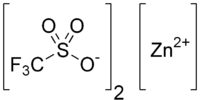Chemistry:Zinc trifluoromethanesulfonate
From HandWiki

| |
| Names | |
|---|---|
| IUPAC name
zinc trifluoromethanesulfonate
| |
| Identifiers | |
3D model (JSmol)
|
|
| ChemSpider | |
PubChem CID
|
|
| |
| |
| Properties | |
| C2F6O6S2Zn | |
| Molar mass | 363.51 g·mol−1 |
| Appearance | White powder |
Except where otherwise noted, data are given for materials in their standard state (at 25 °C [77 °F], 100 kPa). | |
| Infobox references | |
Tracking categories (test):
Zinc trifluoromethanesulfonate or zinc triflate is the zinc salt of trifluoromethanesulfonic acid. It is commonly used as a Lewis acid catalyst, e.g. in silylations.[1]
A white powder, zinc triflate is commercially available, though some workers have experienced inconsistent results with zinc triflate from different sources.[2][3] If desired, it may be prepared from reacting trifluoromethanesulfonic acid with zinc metal in acetonitrile,[4] or with zinc carbonate in methanol:[5]
- Zn + 2 HOTf → Zn(OTf)2 + H2
- ZnCO3 + 2 HOTf → Zn(OTf)2 + H2O + CO2 (OTf = CF3SO2)
References
- ↑ H. Jiang; S. Zhu (2005). "Silylation of 1-alkynes with chlorosilanes promoted by Zn(OTf)2: an efficient way to the preparation of alkynylsilanes". Tetrahedron Letters 46 (3): 517–519. doi:10.1016/j.tetlet.2004.10.175.
- ↑ R. J. Rahaim; J. T. Shaw (2008). "Zinc-Catalyzed Silylation of Terminal Alkynes". J. Org. Chem. 73 (7): 2912–2915. doi:10.1021/jo702557d. PMID 18331056.
- ↑ J. E. D. Kirkham, T. D. L. Courtney, V. Lee and J. E. Baldwin (2005). "Asymmetric synthesis of cytotoxic sponge metabolites R-strongylodiols A and B and an analogue". Tetrahedron 61 (30): 7219–7232. doi:10.1016/j.tet.2005.05.034.
- ↑ J. Lombard, S. Romain, S. Dumas, J. Chauvin, M.-N. Collomb, D. Daveloose, A. Deronzier and J.-C. Leprêtre (2005). "Tetranuclear Polypyridyl Complexes of RuII and FeII: Synthesis, Electrochemical, Photophysical and Photochemical Behaviour". European Journal of Inorganic Chemistry 2005 (16): 3320–3330. doi:10.1002/ejic.200500106.
- ↑ E. J. Corey; K. Shimoji (1983). "Magnesium and zinc-catalyzed thioketalization". Tetrahedron Letters 24 (2): 169–172. doi:10.1016/S0040-4039(00)81357-X.

